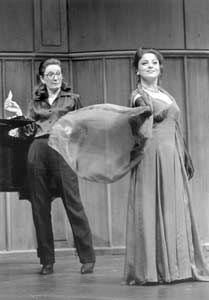![[Metroactive Stage]](/stage/gifs/stage468.gif)
[ Stage Index | San Jose | Metroactive Central | Archives ]
Diva Force
TheatreWorks looks at the redemptive power of art in 'Master Class'
By Rob Pratt
TERRENCE McNALLY'S Tony Award-winning Master Class (best play of 1996) is a work of astonishing emotional depth, given the play's simple setup, a fictionalized account of a series of master classes taught at the Juilliard School of Music during the early '70s by Maria Callas, perhaps the greatest diva of 20th-century opera and surely the most intriguing, Master Class on the surface seems little more than a graduate seminar. But it quickly becomes, as Callas declares, "life and death"--a vital, gut-wrenching search for truth in the arts and lived experience.
TheatreWorks' production of the play heeds Callas' lessons and delivers a theatrical experience both deeply troubling and deeply redemptive. As "La Divina" (as fans affectionately termed the opera singer), Charlotte Cornwell commands the stage. Callas declares in the second act to a tenor preparing to sing an aria, "I'm standing here drinking a glass of water, and I have presence"--and it's absolutely true. Whether at center stage delivering startling revelations about her tortured life or fidgeting while distracted students attempt to sing, Cornwell's Callas remains in charge not so much for her brutality (of which there is plenty) or her sophistication (which there is less of than an opera fan might expect) as for the force of her conviction and for the unfathomable depth of her emotional connection to the music.
Kent Smith, doubling as the production's musical director and playing Manny, Callas' onstage piano accompanist, earns a charming understated effect as the play's straight man. As three students singing for Callas who endure all manner of dressing down, badgering and belittlement, Nikki Maack (Sophie, the dim-wit), John Capes (Tony, the self-adoring tenor) and Marla Kavanaugh (Sharon, the insecure-yet-determined soprano) are all solid performers who do double-duty both as students and as students playing roles from classic opera. None of them, however, manage to render their characters as archetypes that can stand in stark contrast to Cornwell's boldly defined Callas.
Though McNally looks far back on theatrical tradition ("I can trace a line all the way back to Medea, who was a real person," Callas says, describing her approach to building a character), the play has many modern resonances. Callas' assertion that opera is about much more than singing eerily echoes pop hit maker Rodney Jerkins, who, speaking during a Grammy Award forum of record producers earlier this year, explained that his mission isn't simply to mold a singer but to create a star. Callas, in McNally's view, certainly privileges art over artifice, however. In a part of the world where the byte-code result of a few sessions of dorm-room hacking can end up as the weapons global corporate media titans use in battles for quarterly dividends, Master Class might also stand as a cautionary tale that cultural contributions built to last are those crafted with sacrifice, commitment and the application of a fiercely determined will over the course of decades.
[ San Jose | Metroactive Central | Archives ]
Copyright © 2000 Metro Publishing Inc. Metroactive is affiliated with the Boulevards Network.
For more information about the San Jose/Silicon Valley area, visit sanjose.com.
![]()
 A Callas Instructor: Famed opera diva Maria Callas (Charlotte Cornwell) gives some hard life lessons to students like Sharon (Marla Kavanaugh).
A Callas Instructor: Famed opera diva Maria Callas (Charlotte Cornwell) gives some hard life lessons to students like Sharon (Marla Kavanaugh).
Master Class plays Tue at 7:30pm (except Sept 19), Wed-Sat at 8pm (plus Sept 16 and 23 at 2pm), Sun at 2 or 7pm thru Sept 24 at the Mountain View Center for Performing Arts, 500 Castro St, Mountain View. Tickets are $20-$38 (650.903.6000).
From the September 7-13, 2000 issue of Metro, Silicon Valley's Weekly Newspaper.